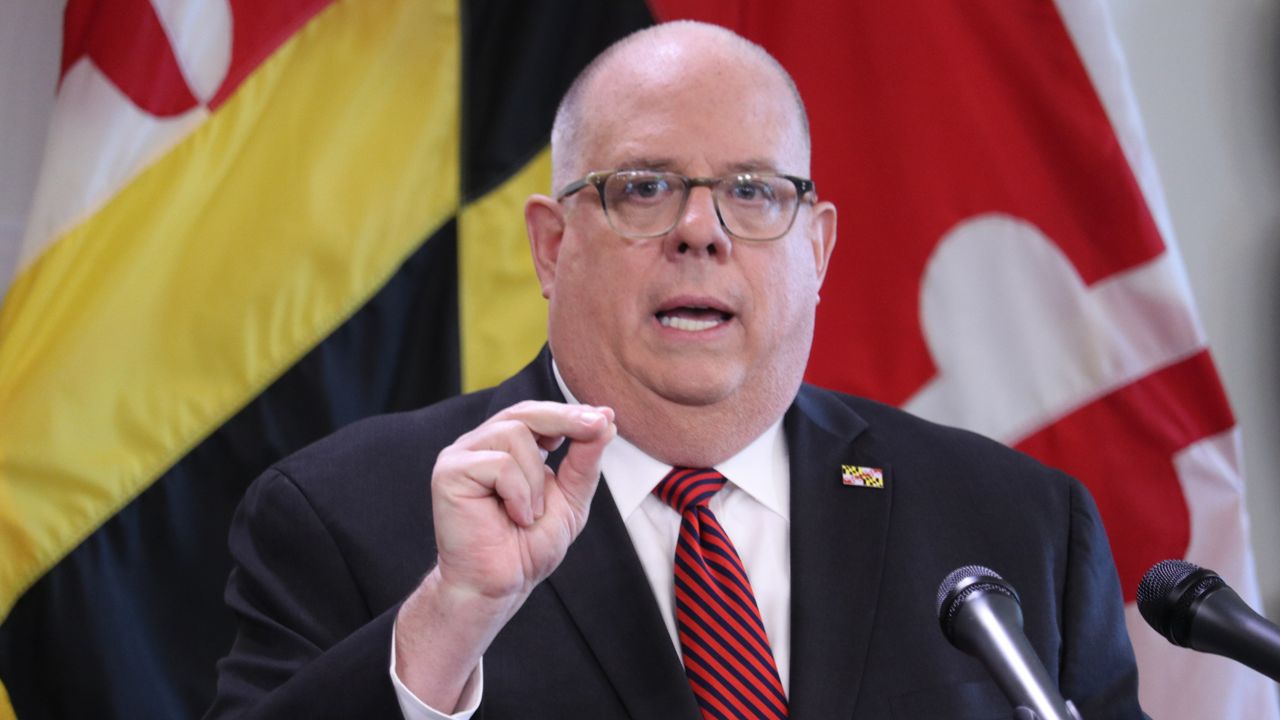BALTIMORE — Maryland’s Larry Hogan is the latest in a spate of Republican Governors who have announced they will not support President Trump in the upcoming elections, but Hogan did have a special person in mind for the ballot.
Last week, the 64-year-old governor wrote in Ronald Reagan’s name for president on his mail-in ballot – the actor-turned-conservative icon who served as the 40th President of the United States from 1981 to 1989, and who passed away in 2004.
The Baltimore Sun reports that Hogan’s vote will officially be cast for "other" by by Anne Arundel County election officials. Maryland has two dozen recognized write-in candidates.
The semantics don’t bother Hogan, who as a frequent and vocal opponent of President Trump, sees his vote for his “hero in politics” as an important protest vote in a state where the incumbent president is deeply unpopular.
A poll this month by Goucher College found that Democrat Joe Biden was leading Trump in Maryland 61% to 30%.
“I know it’s simply symbolic. It’s not going to change the outcome in my state. But I thought it was important to just cast a vote that showed the kind of person I’d like to see in office,” Hogan told the Washington Post in an interview released Friday.
“I’m a lifelong conservative Republican,” Hogan continued. “Reagan was the guy. I marched around as a college kid on the floor of the convention with a Reagan hat and a Reagan sign.”
As a moderate Republican in a heavily Democratic state, Hogan hasn’t been reluctant to criticize Trump. The governor voted for his father, Larry Hogan Sr., for president instead of Trump in 2016.
Hogan, who has in the past said he would consider a run for presidency in 2024, takes particular issue with Trump’s handling of the coronavirus pandemic.
The two experienced friction in April, when the governor announced he had obtained 500,000 virus test kits from South Korea. At the time, Trump said Hogan didn’t need to go to South Korea for tests.
“I think the president made some ridiculous comment that we didn’t have to go find tests, that we can just call Mike Pence and get all the tests we wanted. It was obviously not true,” Hogan said in April. “If I didn’t have to spend three weeks searching all over the world, to find these tests I certainly wouldn’t have.”
In July, Hogan said the Trump administration’s “lackadaisical approach to the spreading disease hindered a national response,” per an interview with the Associated Press.
“All of the leaders in the administration, the experts and the public health doctors at the (Centers for Disease Control and Prevention), they were aware and providing this information. And yet it seemed as if the president was downplaying it and saying, you know, this virus is going to disappear,” Hogan told the outlet.
The governor also criticized the president repeatedly in his book, “Still Standing: Surviving Cancer, Riots, a Global Pandemic and the Toxic Politics that Divide America,” which was released on July 28.
Hogan is not the only Republican governor who has said they do not support Trump’s bid for reelection. On Wednesday, Gov. Charlie Baker of Massachusetts – who will be up for reelection himself in 2022 – said that he would not vote for the president.
"The governor cannot support Donald Trump for president and is focused on seeing Massachusetts through the pandemic," the governor’s communications director Lizzy Guyton wrote in a statement. "He'll leave the election analysis to the pundits."
Baker the same day told reporters he would “take a pass” on answering whether or not he planned on casting his ballot for Joe Biden instead.
In late August, Gov. Phil Scott of Vermont similarly said he was “quite adamant in not supporting the president” in the upcoming elections, but did say that he would consider backing former vice president Joe Biden.
“I have not decided at this point whether to cast a vote for former Vice President Biden,” Scott said at the time. “But it’s something that I would consider. I just haven't made that decision at this point.”
The Associated Press contributed to this report.



